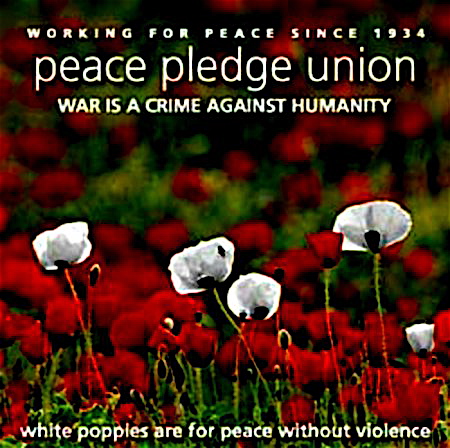Pacifist Communities in Britain in the Second World War
by Andrew Rigby

Peace Pledge Union poster courtesy hastingsonlinetimes.co.uk
“If we got, say, a million voters actively insisting that they’ll never take part in any war,
the Government would have to begin to take notice.” Dick Sheppard. (1)
Such was the optimistic hope and political strategy of Dick Sheppard, the founder and moving spirit of the Peace Pledge Union (PPU), writing in 1936. His faith in the possibility of creating a pacifist movement of such a scale that no government could afford to ignore its influence was not totally unfounded at that time. The PPU had a membership of over 118,000, with some 300 local groups in existence, and a weekly newspaper (Peace News) with sales of approximately 6,000. The origins of the PPU date back to October 1934, when Sheppard published his Peace Letter requesting people to contact him who shared his pacifist determination to renounce war and never support or sanction another one. The burgeoning growth of the PPU in those pre-war days, as the New Statesman observed, lay in its appeal “not only to the convinced absolutist pacifist but to the large number of people with only slight political knowledge but with a recent realization of the fearful imminence of war, who are fascinated by the direct simplicity of the crusade.” (2)
As it was, the PPU failed in its basic aim of preventing war, with the formal declaration coming on September 3, 1939. Given that the PPU had turned its back on becoming an active campaigning movement of war resisters prepared to resist the implementation of war preparations, it now had no practical proposals to offer pacifists as to their appropriate role in wartime. As Sybil Morrison has recorded: There was nothing pacifists could do in 1939 but stand still and say, if they were allowed to say anything at all, that Hitler might be a worse evil than war, but that to try to overcome one evil with another evil was not only morally intolerable but could well lead to even greater evil. (3)
In the absence of any immediately practical pacifist policy, quite a number of PPU members abandoned their absolutist stance as it became clear that the simplicity of the pledge belied the complex dilemmas of conscience and action that confronted the pacifist in wartime. The dilemma of discovering the appropriate role for the pacifist in wartime reached a new intensity in the spring of 1940 when the Germans achieved their military breakthrough in Europe: how to reconcile the promptings of the pacifist conscience with the sense of duty owed to one’s fellow citizens and neighbours? In ideal, typical terms one can identify three different responses to this dilemma that were adopted by different tendencies within the broad pacifist movement – for the sake of alliteration if nothing else, I have labelled these relief, resistance, and reconstruction.
Read the pdf of the complete article here: Pacifist Communities in Britain
EDITOR’S NOTE: Andrew Rigby is Emeritus Professor of Peace Studies, Coventry University and was for many years a Reader in Peace Studies at the Bradford University School of Peace Studies before leaving to become the founding director of the Centre for Peace and Reconciliation Studies at Coventry University. Andrew was drawn to Peace Studies because of his pacifist convictions, which in turn led to his long association with the British pacifist publication Peace News and with War Resisters’ International. His study of the first Palestinian intifada has been re-published in a fully revised edition as The First Palestinian Intifada Revisited, Sparsnäs (Sweden): Irene Publications, 2015. His most recent book (co-authored with Marwan Darweish) is, Popular Protest in Palestine: The Uncertain Future of Unarmed Resistance, London: Pluto Press, 2015. This article has been shared with Peace & Change (Volume 15, No 2, April 1990) under a Creative Commons Attribution 4.0 International License.




